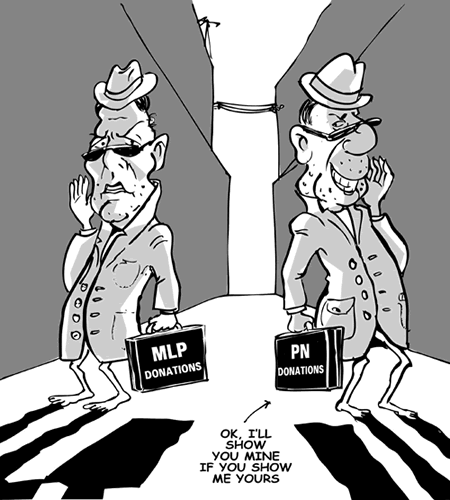It is now official. Joe Saliba, general secretary of the Nationalist Party, has candidly admitted in an interview with The Times that his party accepts secret financial contributions from building contractors.
“No political party can survive without donations,” he told journalist Herman Grech, “I have no doubt that Labour receives donations from contractors as well.”
Saliba may not have realised it at the time, but this admission reveals the extent of the crisis in which democracy finds itself in Malta. On one level, he is right to point out that political parties in other parts of the world also receive financial contributions from major businesses. But what the PN general secretary has entirely overlooked is the fact that these donations are almost invariably regulated by strict laws. Failure to abide by these laws invariably results in scandal; in some cases, it even topples entire gaovernments.
Just last week, the EU Commissioner himself, José Manoel Barroso, was embroiled in a scandal after it was revealed that his party, the Social Democrats (PDS), had accepted a donation by a construction company which was later awarded a tender to build a highway. In this case, the problem concerned the size of the contribution (€233,000, or Lm101,000), which exceeded the legal limit on private donations to political parties.
It seems therefore that Portugal – a country which was de facto a dictatorship until 1974 – has a better grasp of basic transparency and accountability than Malta, where the above scenario is not even against the law… still less the cause of a scandal which now threatens to wreck the EU Commission President’s career.
What we are dealing with over here is an increasingly untenable situation, whereby local building contractors make secret donations to the same two parties which have between them dominated the country’s power structures for the past 40 years. In some cases, these contractors do so because they genuinely want to; in others, however, it is only because they feel obliged to do so for fear of losing out in the long term.
This is objectionable for many reasons. Apart from being an open invitation to nepotism and corruption, the situation has also seriously distorted the country’s commercial playing field. After all, businesses and even private individuals are now subject to increasingly invasive methods to make their every last transaction as transparent as possible. Companies are governed by strict financial laws, regulated by the Malta Financial Services Authority, which compel them (among other things) to regularly publish their accounts. Businesses are likewise subject to strict scrutiny by the Tax Compliance Unit, which as we all know can haul someone over the coals for something as trivial as failing to include casual labour costs in a company’s end of year FS7 return.
From this perspective, Saliba’s revelation now raises several uncomfortable questions: are these secret donations somehow exempt from inspection by the Tax Compliant Unit? Are building contractors free to make undeclared contributions, so long as the recipient is a political party? And doesn’t this fall foul of Malta’s anti-money laundering laws?
Political parties, it seems, have taken full advantage of their stranglehold over parliament to absolve themselves of even the most basic requirements of democratic accountability. In a word, they have legalised a state of affairs which would otherwise (had they been commercial entities or ordinary individuals) land them in prison for a very long time.
To be fair, Prime Minister Lawrence Gonzi was visibly uncomfortable when forced to acknowledge this highly embarrassing issue in public. Interviewed by Illum editor Kurt Sansone last Saturday, Dr Gonzi – who was previously on splendid form when talking about hunting, the economy and other such issues – suddenly found himself at a loss for words when the talk turned to party financing. Admitting that the situation is far from ideal, he claimed that he himself would agree to publish his own party’s accounts; but only on the proviso that the Malta Labour Party does the same.
Sorry, Dr Gonzi, but this is just not good enough in a 21st century European democracy. After all, the present government enjoys a five-seat majority in Parliament. Only a full-scale internal revolt can prevent the Prime Minister from steamrolling the necessary changes through parliament, thereby ending an anomaly which has severely dented our country’s political credibility. Why, then, is the MLP’s consent suddenly deemed necessary? Or is that just an excuse to indefinitely postpone this crucial reform?
Viewed from this angle, Joe Saliba’s frank confession last Saturday was the political equivalent of ripping the bandage off a gaping wound, and then pretending not to notice the bloodstains on the floor. But now that he has finally let the party financing cat out of the bag, the interests of transparency and accountability demand that the situation be rectified as soon as possible.
The time has now come for a long-overdue law which would regulate private financial contributions to political parties, and subject these parties to the same laws that hold good for the rest of us.
After all, this country deserves no less.

